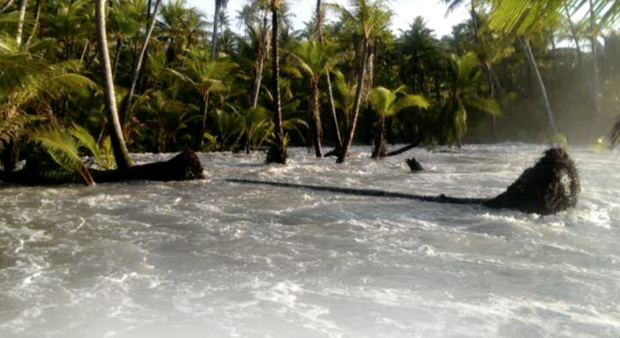
Australia and New Zealand are abandoning their neighbours and contributing to a growing humanitarian crisis through their blocking and inaction on climate change, Greenpeace Australia Pacific's CEO, David Ritter, said.
“Australia and New Zealand have shown themselves to be the worst of neighbours with their self-serving approach to climate change. They will be remembered for their callousness in the face of the grave threats facing Pacific islands, as people are forced to leave their land and lose their livelihoods through climate change,” said Ritter.
“Australia and New Zealand have inadequate national targets are, they are frustrating global talks, they are beholden to big polluters - and now they are blocking a united Pacific voice.”
The Pacific Islands Forum leaders meeting in Port Moresby issued a declaration on climate change Friday calling for global warming to be limited to 2 degrees ahead of the Paris climate talks. The 2C target is championed by Australia and New Zealand, who have ignored pleas from Pacific Island nations for a limit of 1.5 degrees, seen as a minimum to help mitigate the impact of climate change on the islands.
“Eight of 20 of the nations that stand to lose the most economically from natural disasters are in the Pacific region. Low-lying nations like Kiribati, Tuvalu and the Marshall Islands face being rendered completely uninhabitable by rising sea levels.
“Pacific countries are determined to fight for justice, for a fair go from the world community and for the future survival and prosperity of their people. But Pacific island countries are being betrayed by their neighbours, Australia and New Zealand,” Ritter said.
Ritter reacted strongly to news that Prime Minister Tony Abbott and his New Zealand counterpart, John Key, celebrated their success in cementing the 2 degree limit in the Pacific leaders’ declaration.
“The idea that Tony Abbott and John Key would sit down for a beer to celebrate their efforts at bullying some of the smallest, most vulnerable nations in the world is frankly revolting,” he said.
Last week, Ritter was in Port Moresby as part of a Pacific civil society forum which supported demands for strong, urgent action on climate change.
